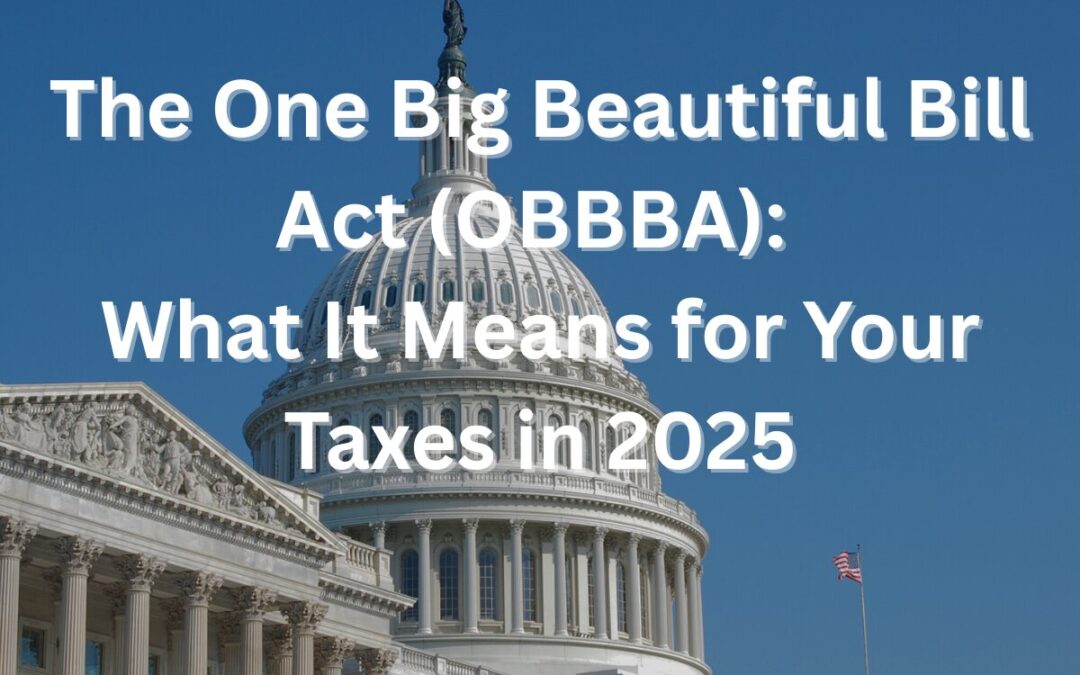Big changes are coming to the tax code in 2025. The One Big Beautiful Bill Act (OBBBA) introduces wide-ranging updates that will impact individuals, families, and business owners. From deductions and credits to estate planning and student loans, this new law reshapes many areas of personal finance.
As a financial planner, my goal is to break down these complex changes so you know what matters most to you and where proactive planning can help.
Key Tax Changes Under OBBBA
1. Higher Standard Deduction — Effective January 1, 2025
-
Single: $15,750
-
Married Filing Jointly: $31,500
This means fewer taxpayers will need to itemize, but those who do may see limits on deductions.
2. Itemized Deductions Get a Cap — Effective January 1, 2025
-
A new SALT $40,000 cap on itemized deductions applies, with added floors and limits based on income.
-
Mortgage interest (including PMI) and charitable contributions are still allowed, but subject to new rules.
3. New Below-the-Line Deductions — Phased in starting 2026
For the first time, OBBBA introduces deductions outside of itemizing. These include:
-
Up to $25,000 for overtime income (effective 2026)
-
$2,000 for tips (effective 2026)
-
$10,000 for vehicle loan interest (effective 2026)
-
An extra $6,000 deduction for seniors (65+) (effective 2026)
4. Expanded Family Credits — Effective 2025, with changes in 2026
-
Child Tax Credit rises to $2,200 (inflation-adjusted) in 2025, with a permanent refundable portion of $1,700.
-
Beginning in 2026, the refundable amount drops to $1,000.
-
Dependent Care FSA limit increases to $7,500 (effective 2026).
-
The Adoption Credit is now $17,280 in 2025 (partly refundable).
5. Estate & Gift Planning — Effective January 19, 2025
-
The estate tax exemption increases permanently to $15 million per person.
-
Without OBBBA, the exemption would have dropped to $13.99 million on January 1, 2026.
6. Student Loan Repayment Changes — Effective 2025–2028
-
Some repayment plans (like SAVE/REPAYE) are eliminated in 2025.
-
PAYE/ICR plans will phase out by July 1, 2028.
-
A new plan, RAP, will be available starting July 1, 2026.
Download the Full OBBBA Comparison Guide
Want to see all the details side by side? Download the full comparison guide here:
Why This Matters
These changes aren’t just numbers on a page; they affect how much tax you’ll pay, how you save, and how you pass on wealth to the next generation. With new deductions and credits, some households could save money, while others may see limits that increase their tax bill.
Planning ahead is key. Strategies around charitable giving, estate planning, and even how you structure your income could all make a difference.
Next Steps
At Flores Wealth Planning, we’re helping clients adjust their financial plans now so they’re ready when these changes take effect.
👉 If you’d like to see how the OBBBA impacts your personal situation, let’s schedule a call. Together, we’ll create a plan to make the most of the opportunities and avoid potential surprises.
📅 https://calendly.com/floresplanning
Disclaimer: This article is for educational purposes only and should not be taken as tax or legal advice. Always consult with your CPA or tax professional regarding your specific situation.


